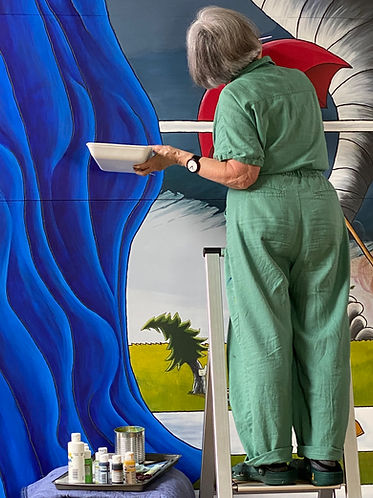





NichoL Brown
Canadian-American Artist (b. 1950)
Artist Bio
Nichol Brown is a self-taught artist whose recognition didn’t begin till well into her 60’s.
Marie Nichol Helene Brown (Poitras) born 25 December 1950 is an American artist known for her contemporary whimsy, and striking use of color to paintings of everyday subject matter.
Born in Grand Falls, New Brunswick, Canada, to Normand and Eva Poitras, Nichol is considered an artist in the contemporary outsider movement. Influenced by depression era American masters, such as Thomas Hart Benton, Grant Wood, and John McCrady's "Swing Low Sweet Chariot" from a young age, she became increasingly attracted to African American artists and the unvarnished statements their work made on life. Nichol has been naturally reclusive most of her life – entering public only when life demands. The fourth child of five, she was born into an uneducated, artistic household that struggled with poverty before moving to the United States one month before turning five.
Upon getting married, Nichol lived in Europe throughout the cold war before returning to the United States in 1992. Nichol moved with rapid succession for several years ultimately settling down in rural Virginia in 2016. Each move added a distinguishable influence on not only her work but the communities she joined to produce and exhibit each piece. One such notable move was to Cleveland, Ohio where Nichol lived life within a short distance to the Cleveland Museum of Art. There she was introduced to the posthumous works of print maker Mabel Hewitt that inspired Nichol’s largest solo exhibition to date, “Soul of the Ordinary.”
Her work has graced the halls of many prestigious institutions including the Geffen Contemporary at MOCA in Los Angeles and the Eiteljorg Museum in Indianapolis through the Artist in Cellophane Project. Her work can also be found in many private collections around the world.
Nichol’s artistic repertoire includes painting, illustration, time-lapse and stop-motion film, furniture and sculpture.. She also writes children’s stories for her own amusement. Major themes in her work include the sky, pastoral and often whimsical dream like landscapes, God, every day objects and human activity in its simplest forms. In her later years, Nichol's work took on religiously based political conversations with her “Please Don’t Deport Me” and “WAR” series. It would not be the last time she touched on modern questions of God's will on life.
- 01
- 02
- 03
- 04
- 05








